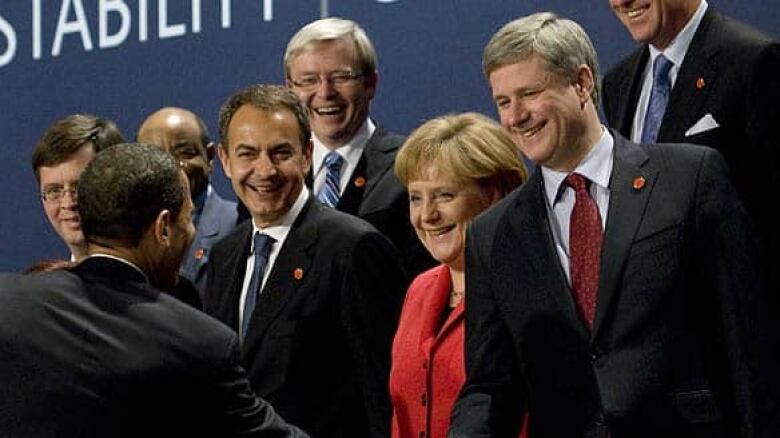Deal part of 'unprecedented' response to crisis: Harper
Protectionism 'the greatest risk to the economy'

Harper's comments came after British Prime Minister Gordon Brown announced that G20 nations will be injecting $1 trillion into the world economy in an effort to curb the global financial crisis.
Also included in the summit's communiqué are commitments to bring hedge funds within a global regulatory net, to end bank secrecy, to maintain expansionist policies and to inject $250 billion in trade finance into the global economy over next two years.
Harper told reporters in London the actions that world leaders have taken "really is unprecedented, co-ordinated, and fast action by the international community to an economic crisis, and frankly a speed and level of engagement that we've never seen in the past."
"Indeed, we have another meeting a little later on this year, but I feel that these measures should give markets an awful lot of confidence," he said in French, referring to G8 talks to be held in Italy in the summer.
Harper said that going into the summit, fighting protectionism, fixing the financial system and stimulating the global economy had been Canada's priorities.
He spoke particularly ardently of the dangers of protectionism, which he called "the greatest risk to the economy, and I'm not going to tell you it's solved."
"There are, in many cases, very good arguments for [protectionist demands]," he said.
"They will assist certain industries, sectors, and even individual companies, but they will do so at the expense of the wider economy and at the risk of a general drift in this direction globally. We absolutely must avoid that. All leaders are agreed to that."
The end-of-summit communiqué included language that would have the World Trade Organization and other organizations list countries that adopted protectionist measures and their offending actions. Harper said publishing these transgressions will put pressure on countries tempted by protectionist measures.
Harper admits protectionism risks in auto bailout
World Bank experts, in a report released Tuesday, suggested Canadian and U.S. plans to bail out the beleaguered Detroit Big Three automakers were protectionist and hampered trade. When asked Thursday if such interpretations made Canada think twice about its auto policies, Harper said he "would agree there are risks in that regard."

Federal Industry Minister Tony Clement said Monday the first of the $4 billion in interim loans to the two companies is going out this week. Chrysler got $250 million on Monday of the $1 billion allocated, while the first of $3 billion in funds for GM will begin to flow later in April.
"We are being very careful to ensure that assistance is available across the board and equitably and not in a way that's simply to the benefit of certain companies or enhances some kind of protectionist agenda," Harper said.
"It is not just the Detroit Three automakers in Canada who are supporting our actions."
Canada has tailored its actions domestically, keeping in mind the interests of spinoff industries like parts suppliers that rely on the automakers, he said.
Canada has co-ordinated bailout actions with the U.S. government in a bid to ensure there will be no protectionist action against Canada, he said, "and that was a No. 1 priority in getting ourselves involved in the auto sector in this way."
"So let me be very clear, while there could be risks in that policy, Canada is very conscious of those risks and determined to avoid protectionism in the implementation of our auto sector policies."
Canada well-positioned
Canada, despite its difficulties, still remains in good shape, because of a regulatory system that enabled domestic banks to stave off many of the ills afflicting other institutions overseas, Harper said. Canada co-authored a report on financial regulations that was part of the blueprint of Thursday's summit document, he said.
While Harper acknowledged that the recession may have deepened in recent months, he said there is more stability now than there was in November.
"So I don't think we're going to turn the corner on this recession tomorrow, but I do think markets can rest assured they have a range of governments around the world who share fundamental economic values about two things: the importance of globalized markets and free trade, … [and] also the importance of governments' responsibilities to act economically and socially when catastrophe hits."
The leaders of the world's major economies assembled at the ExCel Centre in London's Docklands district with the hope of developing co-ordinated rules for financial markets that are meant to spark a global recovery.
The wording of the communiqué includes stern language on international financial reform, indicating credit agencies will be regulated to end conflicts of interest. Tax havens will also be forced to disclose their banking details.